Delta Air Lines, Inc.
Summary
- Delta Air Lines, Inc. is a global airline based in the United States. The company and its alliance partners serve over 130 countries and territories, 800 destinations around the world.
- As of December 31, 2022, the company had approximately 95,000 full-time employee equivalents, of which approximately 93,000 were based in the U.S.
- Compared to the March 2019 quarter, total revenue increased $2.3 billion, or 22%, and total operating expense increased $3.6 billion, or 38%, with 2% lower capacity.
- Due to still sustaining COVID-19 impact in the first quarter of 2022, comparison of its with Q1 2023 is not meaningful. However, the full-fledge operation of the company was running in 2019.
- Net loss of the company during the first quarter of 2023 is $363 million which was $940 million loss in March 2022 quarter.
- During 2022, Delta Air Lines has reported total operating revenue of $50.58 billion which was $29.90 million a year earlier, an increase of $20.7 million. Operating income reported is $3.66 billion in 2022 as compared to $1.89 billion a year earlier, an increase of 94%.
- In 2022, the company has reported a net income of $1,318 million which was $280 million a year earlier. Diluted earnings per share during the years were $2.06 and $0.44, respectively.
Brief Company Overview
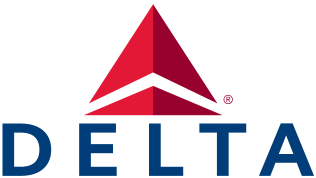 Delta Air Lines, Inc. (NYSE:DAL) is a global airline based in the United States. The company and its alliance partners serve over 130 countries and territories, 800 destinations around the world. As of 2022, the company offers more than 4,000 daily flights to more than 275 destinations on six continents. Delta is one of the world's oldest air lines in operation. The company is headquartered in Atlanta, Georgia. The company was founded March 2, 1925 and commenced operation in 1929. The global network of the company is supported by a fleet of approximately 1,250 aircraft as of December 31, 2022.
Delta Air Lines, Inc. (NYSE:DAL) is a global airline based in the United States. The company and its alliance partners serve over 130 countries and territories, 800 destinations around the world. As of 2022, the company offers more than 4,000 daily flights to more than 275 destinations on six continents. Delta is one of the world's oldest air lines in operation. The company is headquartered in Atlanta, Georgia. The company was founded March 2, 1925 and commenced operation in 1929. The global network of the company is supported by a fleet of approximately 1,250 aircraft as of December 31, 2022.
The company provides scheduled air transportation for passengers and cargo in the United States and internationally. It also provides aircraft maintenance and engineering support, repair, and overhaul services; and vacation packages to third-party consumers, as well as aircraft charters, and management and programs. The company operates through two segments, Airline and Refinery. Its domestic network centered on core hubs in Atlanta, Minneapolis-St. Paul, Detroit, and Salt Lake City, as well as coastal hub positions in Boston, Los Angeles, New York-LaGuardia, New York-JFK, and Seattle; and international network centered on hubs and market presence in Amsterdam, Mexico City, London-Heathrow, Paris-Charles de Gaulle, and Seoul-Incheon. As of December 31, 2022, the company had approximately 95,000 full-time employee equivalents, of which approximately 93,000 were based in the U.S.
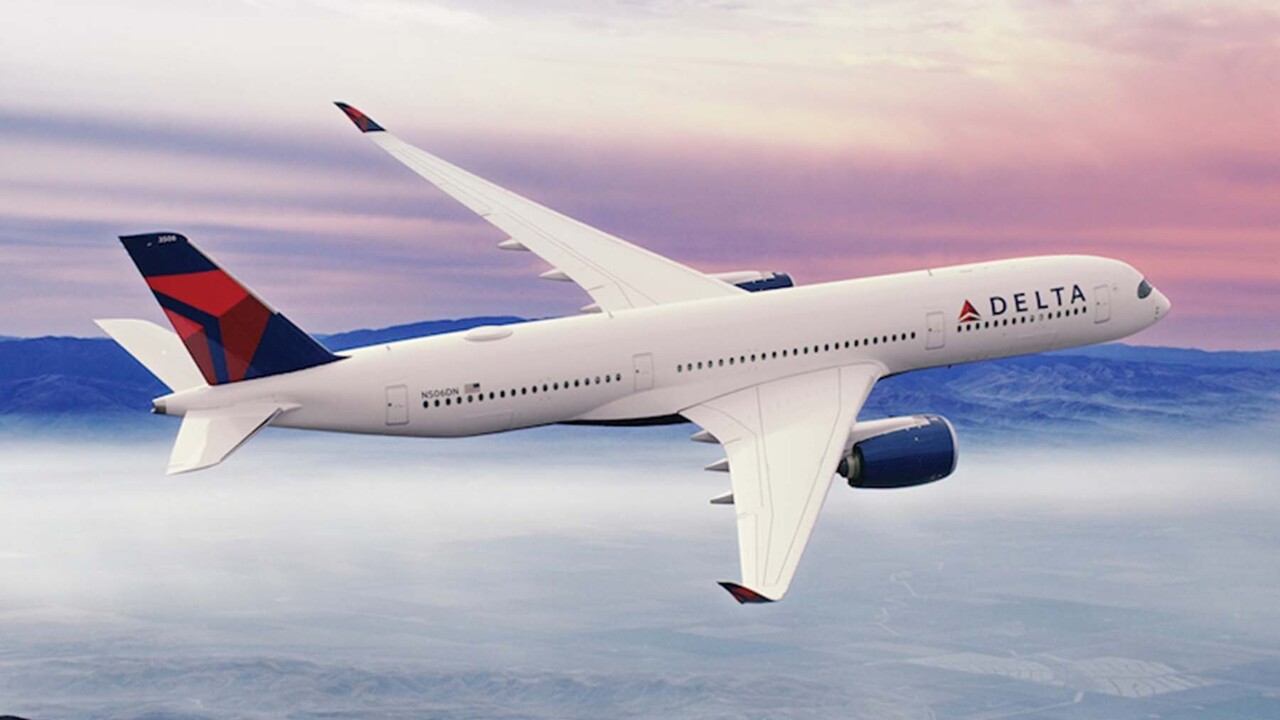
As of June 2023, 52-weeks' price range of the company stock is $40.34 to $27.20. The company has a trailing P/E of 13.23 times, price to sales ratio (ttm) of 0.47 times, profit margin is 3.51%, operating margin (ttm) is 9.37%, return on assets (ttm) is 4.30%, return on equity (ttm) is 40.97%. Diluted earnings per share (EPS) of the company is $3.05 for the trailing twelve months period, debt to equity ratio (mrq) is 489.78 times.
Recent Developments
- In July 2022, Delta Air Lines entered into a purchase agreement with Boeing for 100 Boeing 737-10 aircraft, the largest model in the 737 MAX family, to start delivery in 2025 with the option to purchase an additional thirty 737-10 aircraft.1
Recent Financing Activities
- In the March 2023 quarter, the company repurchased a principal amount of $468 million of various secured notes and a portion of the SkyMiles Term Loan on the open market and made early principal repayments of $227 million on various notes secured by aircraft. These payments resulted in a $22 million loss on extinguishment of debt.
- During 2022, Delta Air Lines repaid approximately $4.5 billion in debt and finance lease obligations.
Financial Performance Highlights
Q1 2023 Highlights
Due to still sustaining COVID-19 impact in the first quarter of 2022, comparison of its with Q1 2023 is not meaningful. However, the full-fledge operation of the company was running in 2019. Compared to the March 2019 quarter, total revenue increased $2.3 billion, or 22%, and total operating expense increased $3.6 billion, or 38%, with 2% lower capacity. Compared to the March 2022 quarter, operating revenue increased $3.4 billion, or 36%, due primarily to increased travel demand and higher yield, as well as a capacity increase of 18%. Operating loss for the March 2023 quarter was $277 million, representing a $506 million improvement compared to the March 2022 quarter.
Net loss of the company during the first quarter of 2023 is $363 million which was $940 million loss in March 2022 quarter. Diluted loss per share is $0.57 and $1.48 for the periods, respectively.
Annual Performance Highlights
During 2022, Delta Air Lines has reported total operating revenue of $50.58 billion which was $29.90 million a year earlier, an increase of $20.7 million. The increase in revenue is primarily due to continued recovery in travel demand from the COVID-19 pandemic and higher refinery sales to third parties. Improvement in premium products revenue resulted from both a shift in the mix of seats on aircraft following the retirement of certain fleets in 2020 and delivery of new aircraft since that time, as well as incremental increase in demand, particularly from leisure customers. Operating income reported is $3.66 billion in 2022 as compared to $1.89 billion a year earlier, an increase of 94%. The increases in operating income were primarily due to the continued recovery in the demand for air travel during 2022, which resulted in a 69% increase in operating revenue on a 20% increase in system capacity. However, due to the unusual rhythm of operation during Covid-19, the results of 2022 must be compared with the latest year of normal operation in 2019. The 2022 operating income decreased $3.0 billion compared to 2019 primarily due to an increase in operating costs, including a 35% increase in fuel cost, and lower passenger revenue due to system capacity that was 15% lower as the company continued to restore their operations from the effects of the COVID-19 pandemic.
Total operating expense increased $18.9 billion, or 67%, compared to 2021. Total non-operating expense was $1.7 billion in 2022, $259 million higher than 2021 primarily due to higher mark-to-market losses on certain equity investments, partially offset by reduced losses on the equity method investments, lower interest expense as a result of debt reduction initiatives and lower losses on extinguishment of debt.
In 2022, the company has reported a net income of $1,318 million which was $280 million a year earlier. Diluted earnings per share during the years were $2.06 and $0.44, respectively. The company used to pay dividends regularly, but due to the pandemic effects, it has stopped paying dividend.
Total operating revenue of the company from the refinery segment is $10.71 billion in 2022 which was $6.05 billion a year earlier, an increase of 77%. Operating income of the company in 2022 is $0.7 billion, which was a loss of $2 million a year earlier. The revenue increase is primarily a result of increase in third-party refinery sales and sales to the airline segment. The increase in third-party refinery sales resulted from higher pricing and production during 2022 compared to 2021.
During 2022, operating activities provided cash flows of $6.4 billion, primarily on improving ticket sales, and incurred approximately $6.9 billion of net investing cash outflows, primarily for $6.4 billion of capital expenditures. Net cash used in investing activities of the company is $6.92 billion in 2022 and $0.90 billion a year earlier. Net cash used in financing activities for the years are $4.53 billion and $3.85 billion, respectively.
Business Overview
Delta Air Lines is a global company serving customers throughout its global network. In the industry, the company differentiates its products offering based on its people and culture, operational reliability, global network, customer loyalty and financial foundation. As part of the differentiation strategy, the company has hired approximately 25,000 new team members in 2022. Forbes recognized Delta as No. 6 on its list of the World’s Best Employers for 2022.
As part of operation reliability, the company cites a system-wide completion factor of 98.6%, and on-time arrival of 71.1% of its domestic flights. In January 2023, the Wall Street Journal named Delta the top airline of 2022 among the nine U.S. airlines in its annual airline scorecard for the second consecutive year, leading the industry in on-time arrivals, completion factor and involuntary denied boardings.
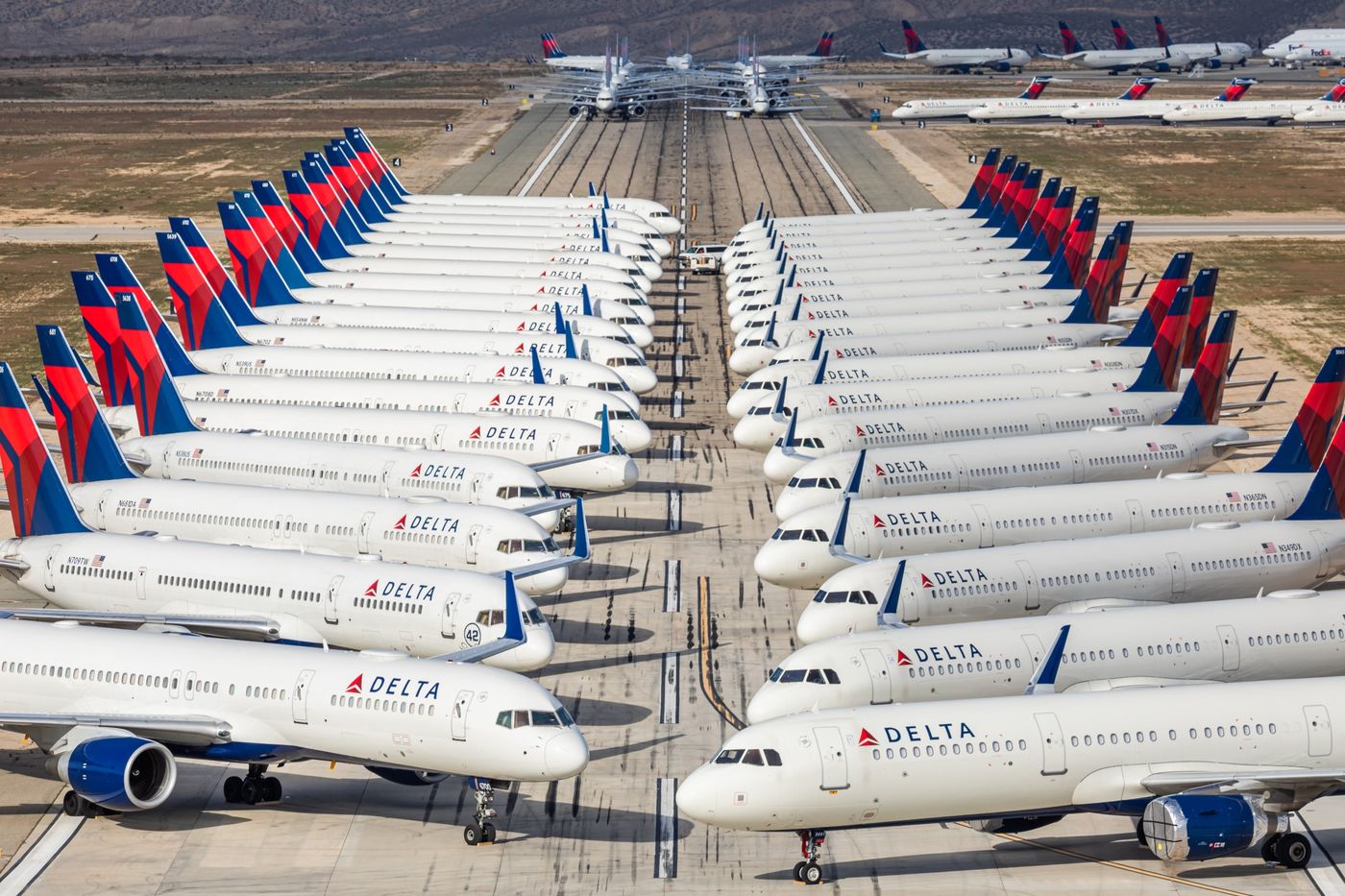
Delta Air Lines and their alliance partners collectively serve over 130 countries and territories and over 800 destinations around the world. At the end of 2022, the company offered more than 4,000 daily flights to more than 275 destinations on six continents. Domestic network of the company is centered around core hubs in Atlanta, Minneapolis-St. Paul, Detroit and Salt Lake City. Core hubs have strong local passenger share, a high penetration of customers loyal to Delta, a competitive cost position and strong margins. Core hub positions complement coastal hub positions in Boston, Los Angeles, New York-LaGuardia, New York-JFK and Seattle. Coastal hubs provide a strong presence in large revenue markets and enable growth in premium products and international service. In 2022, the company focused on solidifying their positions in the coastal hubs, securing leading positions in Boston and Los Angeles. Internationally, the company has significant hubs and market presence in Amsterdam, London-Heathrow, Mexico City, ParisCharles de Gaulle and Seoul-Incheon. The company has innovative alliances with Aeroméxico, LATAM Airlines Group S.A. ("LATAM"), Air France-KLM, China Eastern, Korean Air and Virgin Atlantic. The global network of the company is supported by a fleet of approximately 1,250 aircraft as of December 31, 2022. In 2022, the company took delivery of 69 aircraft, including new A321neos, A220-100s, A220-300s, A330-900s, A350-900s and pre-owned CRJ-900s and Boeing 737-900ERs. The new aircraft are on an average 25% more fuel efficient per seat mile than retiring aircraft.
Joint Venture/Cooperation Agreements
Delta Air Lines has marketing alliances with other airlines to enhance their access to domestic and international markets. The company has implemented four separate joint venture or joint cooperation agreements with foreign carriers.
- A combined joint venture with Air France, KLM and Virgin Atlantic with respect to transatlantic traffic flows. In addition to the joint venture, the company owns a non-controlling 49% equity stake in Virgin Atlantic Limited, the parent company of Virgin Atlantic Airways and a 3% ownership stake in the parent company of Air France and KLM.
- A joint cooperation agreement with Aeroméxico with respect to trans-border traffic flows between the U.S. and Mexico. In addition to the joint cooperation agreement, the company currently owns an approximately 20% equity stake in Grupo Aeroméxico, S.A.B. de C.V., the parent company of Aeroméxico. In March 2022, Grupo Aeroméxico emerged from its voluntary proceedings to reorganize under Chapter 11 of the United States bankruptcy code.
- A joint venture agreement with LATAM with respect to traffic flows between North and South America, allowing passengers to access more than 300 destinations between the United States/Canada and South America (Brazil, Chile, Colombia, Paraguay, Peru and Uruguay). Upon completion of LATAM's restructuring process in November 2022, Delta Air Lines acquired an approximately 10% equity stake in LATAM.
- A joint venture with Korean Air with respect to traffic flows between the United States and certain countries in Asia. In addition to the joint venture, the company owns just under 15% of the outstanding common stock of Hanjin-KAL, the largest shareholder of Korean Air.
Delta Air Lines also owns a 2% equity interest in China Eastern, with whom the company has a strategic joint marketing and commercial cooperation arrangement covering traffic flows between China and the U.S., which includes reciprocal codesharing, loyalty program participation, airport lounge access and joint sales cooperation.
Delta Air Lines is also a member of the SkyTeam global airline alliance. The other members of SkyTeam are Aerolíneas Argentinas, Aeroméxico, Air Europa, Air France, China Airlines, China Eastern, Czech Airlines, Garuda Indonesia, ITA Airways, Kenya Airways, KLM, Korean Air, Middle East Airlines, Saudia, TAROM, Vietnam Airlines and Xiamen Airlines. Virgin Atlantic is expected to join the SkyTeam alliance in early 2023. Through alliance arrangements with other SkyTeam carriers, the company is able to link their network with the route networks of the other member airlines, providing opportunities to increase connecting traffic while offering enhanced customer service through reciprocal codesharing and loyalty program participation, airport lounge access and cargo operations.
Regional Carriers
For serving the small and medium-sized cities in the domestic market, Delta Air has service agreements with domestic regional air carriers. The regional carriers feed traffic to Delta's route system. Through the regional carrier program, Delta Connection® , Delta Air Lines has contractual arrangements with regional carriers to operate aircraft using the company's "DL" designator code. The company currently has contractual arrangements with Endeavor Air, Inc., a wholly owned subsidiary of the company ("Endeavor"), Republic Airways, Inc., SkyWest Airlines, Inc. ("SkyWest Airlines"). The contractual agreements with regional carriers are primarily capacity purchase arrangements, under which Delta Air Lines controls the scheduling, pricing, reservations, ticketing and seat inventories for the regional carriers' flights operating under the "DL" designator code. The company is entitled to all ticket, cargo, mail. in-flight and ancillary revenues associated with the flights under these capacity purchase arrangements. SkyWest Airlines operates some flights under a revenue proration agreement for Delta. This proration agreement establishes a fixed dollar or percentage division of revenues for tickets sold to passengers traveling on connecting flight itineraries.
Cargo
Delta Air Lines generates cargo revenues in domestic and international markets through the use of cargo space on regularly scheduled passenger aircraft. The company is a member of SkyTeam Cargo, an international airline cargo alliance with ten other airlines that offer a network spanning six continents, through which Delta provides global solutions to their customers by connecting their network with those partners.
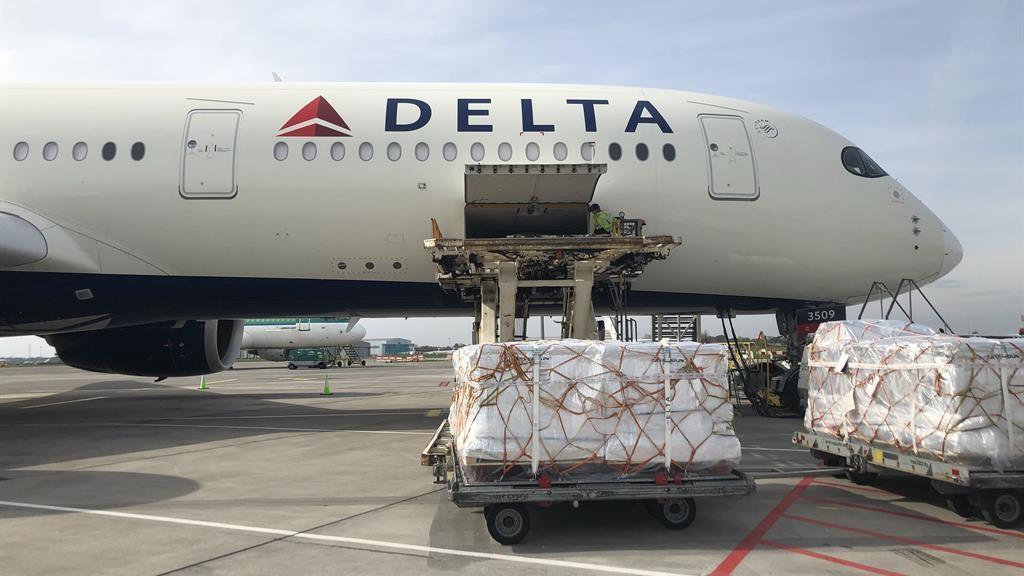
Other Complementary Business
In addition to providing maintenance and engineering support for their own fleet of approximately 1,250 mainline and regional aircraft, Delta's MRO operation, known as Delta TechOps, serves aviation and airline customers from around the world. With agreements to service multiple next-generation aircraft engines, Delta TechOps is positioned as a leading global service provider for state-of-the-art, more sustainable engines. Delta Vacations, the vacation wholesale subsidiary of Delta, provides vacation packages to third-party consumers. In 2022, the total revenue from the MRO operation and Delta Vacations was approximately $850 million.
Refinery Segment
The refinery operated by Delta's wholly owned subsidiary Monroe primarily produces gasoline, diesel and jet fuel. Monroe has agreements in place to exchange the non-jet fuel products the refinery produces with third parties for jet fuel consumed in Delta's airline operations. The jet fuel produced and procured through exchanging gasoline and diesel fuel produced by the refinery provided approximately 200,000 barrels per day, or approximately 75% of the pre-COVID-19 pandemic consumption, for use in airline operations.
Company History2
Delta was founded on March 2, 1925, as Huff Daland Dusters—the world's first aerial crop-dusting company. The crop-dusting operation has formed the roots for Delta, begins in Macon, Ga. During 1925, Huff Daland Dusters' 18-planes fleet was the largest privately-owned fleet in the world. Operations ranged from south to Florida, north to Arkansas, and west to California and Mexico. In 1927, Huff Daland extended its dusting services to Peru. In 1928, C.E. Woolman led a movement to buy Huff Daland Dusters. Renamed “Delta Air Service” for the Mississippi River Delta region it served. In 1929, Delta operated its first passenger flights over route stretching from Dallas, Texas to Jackson, Mississippi, via Shreveport and Monroe, Louisiana.
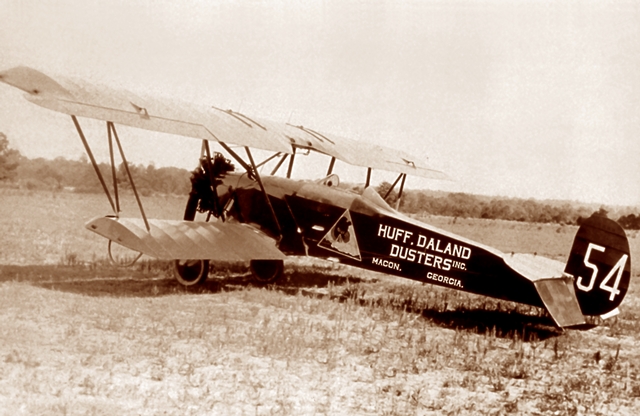
The company was renamed to Delta Air Corporation in 1930. Delta has suspended all passengers operations in 1930 when it lost the airmail contract. The company regained the contract in 1934 and began doing business as Delta Air Lines over Mail Route 24, stretching from Fort Worth, Texas, to Charleston, South Carolina. In 1941, Delta headquarters moves from Monroe to Atlanta. Atlanta is now the center of Delta's new 16-city route system. The name of the company was changed to Delta Air Lines in 1945. Delta started its first international routes to Caribbean and Caracas in 1953 after acquisition of Chicago and Southern Air Lines. In 1959, Delta is first airline to launch Douglas DC-8 jet service. The red, white, and blue triangle "widget" becomes Delta's logo, resembling the swept-wing appearance of a jet.
Delta activates the electronic SABRE system for "instant" reservations in 1962. In 1964, the company starts Deltamatic reservation system with IBM 7074 computers. In 1966, Delta's founder C.E. Woolman dies and Charles H. Dolson replaces him. The company ceases its crop-dusting operations in the same year. In 1972, Northeast Airlines merges with Delta. Delta becomes a major carrier in Boston and New York, with direct routes from NYC and New England to Florida, Canada, Bahamas and Bermuda. By 1974, Delta ranked first for 17 consecutive years as #1 major U.S. airline for customer service also Delta has fewest passenger complaints as ranked by the Department of Transportation. In 1987, the company acquired Western Airlines. In 1997, Delta was the first airline to board more than 100 million passengers in a calendar year. Also that year, Delta began an expansion of its international routes into Latin America. In 2003, the company launched Song, a low-cost carrier.
On September 14, 2005, the company filed for bankruptcy, citing rising fuel costs. It emerged from bankruptcy in April 2007 after fending off a hostile takeover from US Airways and its shares were re-listed on the New York Stock Exchange. In 2008, Northwest Airlines merges with Delta, creating global airline with major passenger and cargo operations in every region of the world. Delta in 2009 expands its transatlantic joint venture with Air France-KLM. Becomes only U.S. airline (since Pan Am) to serve six continents with introduction of nonstop flights between Los Angeles and Sydney, Australia.
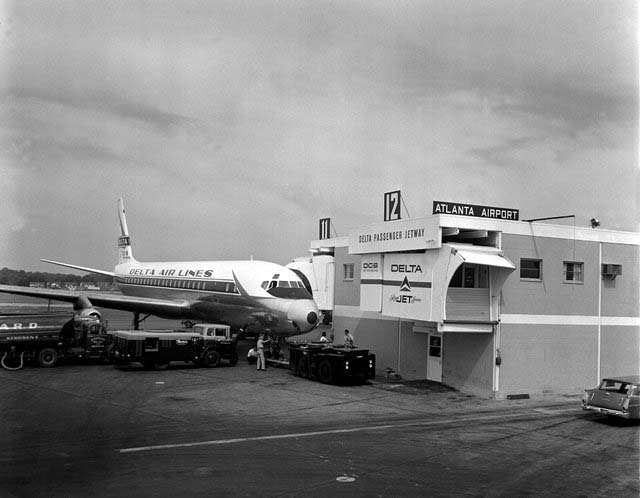
The company becomes the first airline with mobile baggage tracking, via Fly Delta app, in 2011. Delta acquires 49% stake in U.K. airline Virgin Atlantic, a partnership that increases Delta's access to the important London and trans-Atlantic markets. The company celebrates 85 years of passenger service in 2014, also named one of Fortune's Most Admired Companies. In 2015, the company purchases a 3.5% stake in China Eastern, expanding the airline’s presence and customer choice in Asia’s largest market. Delta launches joint venture partnership with Korean Air with hub in Seoul in 2018.




